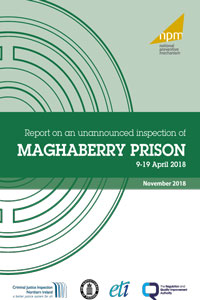Report on an unannounced inspection of Maghaberry Prison
Publication: 27/11/18

Chief Inspectors welcome ‘significant progress’ made to improve Maghaberry Prison
An independent inspection of Maghaberry Prison has revealed ‘significant progress’ has been made creating a safer, more settled environment for prisoners and staff, three years after the high security facility was described as unsafe and unstable.
The findings of the latest inspection were jointly published today (27 November 2018) by Brendan McGuigan, Chief Inspector of Criminal Justice in Northern Ireland and Peter Clarke, Her Majesty's Chief Inspector of Prisons in England and Wales.
“Inspectors from Criminal Justice Inspection Northern Ireland (CJI), Her Majesty's Inspectorate of Prisons in England and Wales (HMIP), the Regulation and Quality Improvement Authority (RQIA) and the Education and Training Inspectorate (ETI) were immensely encouraged by the level of progress that had been made when this inspection of Maghaberry Prison was conducted in April 2018,” said Mr McGuigan and Mr Clarke.
“We pay tribute to the work undertaken to date by staff and the senior management team at the prison and the leadership provided within the Northern Ireland Prison Service (NIPS) for what they have achieved,” said the Chief Inspectors
“The prison had settled considerably and in terms of its operation and outcomes for prisoners, it was in a different place compared to 2015. Staff and prisoner relationships had transformed and Inspectors found motivated, enthusiastic prison staff who were doing excellent work with the men in their care,” said Mr McGuigan.
The use of first names was now the norm and previous ‘no go’ areas such as association spaces and exercise yards were being regularly patrolled by prison staff.
Efforts to reduce the supply and use of illegal drugs within the prison were also bearing fruit with the ‘zero tolerance’ approach adopted by management leading to a reduction in the availability of illicit drugs.
Inspectors found that outcomes in relation to all four of the ‘healthy prison’ tests had improved compared to three years ago.
“The overall picture of safety had progressed hugely and Maghaberry felt much safer at the time of this inspection. Levels of violence and disorder had reduced and were now lower than would be usually seen in similar prisons in England and Wales,” said Mr Clarke.
The Chief Inspectors said they were also impressed by the work undertaken to reintegrate prisoners, who had been living in segregated conditions for long periods of time, back into the main prison population.
However, they remained concerned that work to support the most vulnerable men at Maghaberry had not developed to the same level as other aspects of safety.
“We recognise efforts to support men who were vulnerable to self-harm had moved on and the Prisoner Support and Safety Team was engaged in good work in this area, but further progress is required,” said Mr McGuigan.
“More must be done to implement and embed into operational practice the recommendations made by the Prisoner Ombudsman’s Office in its death-in-custody reports,” continued Mr McGuigan, who stressed that prison did not provide a therapeutic environment for those requiring mental health support and care.
“We also recommend the use of observation cells and strip clothing - which can add to isolation and distress for vulnerable men - should be reduced, and a more caring approach which seeks to understand and address the underlying causes of vulnerability and incidents of self-harm be adopted,” added Mr Clarke.
The Chief Inspectors said that in contrast to the chaotic, unpredictable daily regime they found at Maghaberry three years ago, daily life within the prison in 2018 had changed.
“The leadership team at the prison has made concerted efforts to stabilise the daily regime and at the time of this inspection about half of the men were out of their cells for nine or more hours each day and the core day at the prison was more predictable,” said Mr Clarke.
Health care Inspectors found that staff morale and leadership within health care had improved and that progress had been made in relation to provision of appropriate services to treat chronic diseases and the management of staff shortages.
Inspectors observed that while learning, skills and work provision at Maghaberry had improved, prison leaders recognised additional work was required to expand the curriculum and range of education and training opportunities available and improve attainment levels.
Rehabilitation and release planning work was acknowledged as the highest performing area within the prison with children and family provision at Maghaberry highlighted as a particular strength.
“Inspectors identified the work ongoing within the specialist Families Matter Unit within Braid House as an area of good practice which other similar prison establishments could follow to achieve similar positive outcomes for prisoners,” said Mr McGuigan.
He also welcomed the excellent work ongoing to support prisoners to reduce their risk of harm and prepare them to reintegrate back into the community on release.
Reflecting on the key findings of this inspection report, Mr McGuigan and Mr Clarke said:
“This is an immensely encouraging inspection of a prison that had previously struggled to provide a safe, respectful and purposeful environment for the men held there,” they said.
“We rarely see a prison make the sort of progress evident at Maghaberry. It is to the credit of all those involved that many of the outcomes for the men held at the prison are now among the best we have seen in this type of prison in recent years,” said the Chief Inspectors.
“We welcome the progress that has been made and would encourage all within the Prison Service and the South Eastern Health and Social Care Trust to maintain this focus on improvement so Maghaberry continues to move forward and meet the standards required from a 21st Century prison establishment,” concluded Mr McGuigan.